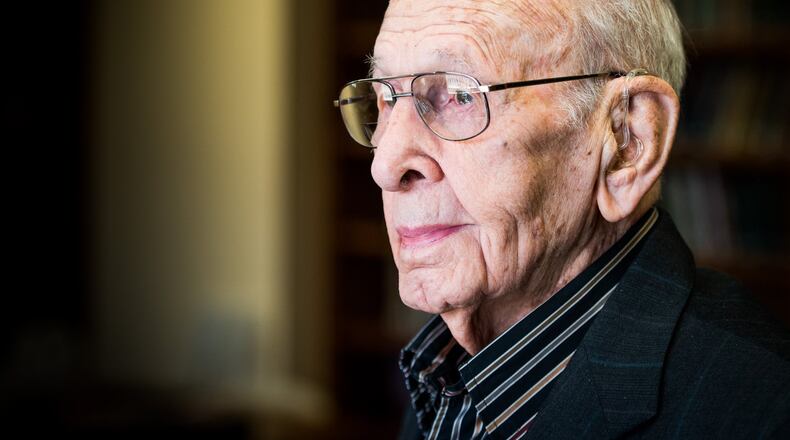When Masters was born at home in Middle Tennessee on Nov. 11, 1914, he was “a very poor excuse for a boy” because of his fragile health, he said. There were two doctors present for the delivery and they told his father to worry about his wife, not his son.
“Forget about the baby,” the doctors told him. “The baby is not going to live.”
Those doctors should see Masters today.
He has outlived his five brothers and two sisters, and his mind and body remain sharp. He can’t remember the last time he needed a pain pill.
On Wednesday, Masters was the star of the show as Hospice Care of Middletown hosted a Veterans Day luncheon at Crosspointe Church on Ohio 122. He was accompanied by one of his four daughters, Susan Masters, 61, and one of his nine grandchildren, Stephanie Lewis.
Before the interview, Masters said he needed to wear his hearing aid, but he never asked his daughter or granddaughter for help remembering dates or details.
Susan Masters described her father as “a tremendous role model” and said “what you see is what you get.”
Then she added: “He doesn’t live life very anxiously.”
Is there a secret to living to be 104?
“Everybody asks that,” he said. “Everybody has an excuse, but I don’t. I have a very positive outlook on life. I accept the world as it is. I don’t try to help God run it. I respect everybody and I have no enemies. Nobody I hate. I don’t love everybody. But I believe in everybody having their rights. That has added to my longevity.”
That longevity could have been cut short by WWII.
Masters was drafted into the Army in 1942. He was working in Detroit at the time.
“I was ready to go,” said Masters, who lives in Sycamore Glenn Retirement Center in Miamisburg. “I didn’t resist at all.”
He was shipped to Fort Roberts in California for basic training and later was assigned to the U.S. Army Intelligence Department. He served until 1944 and said the “worst” fight was the Battle of Buna, part of the New Guinea campaign in the Pacific Theatre during World War II.
He said the Japanese invaded the northern shore, and American soldiers intercepted them.
“Really vicious” is how Masters described the battle. He said 700 Japanese soldiers were killed and Masters was unsure how many Americans were killed.
While there, Masters caught malaria and was hospitalized, then was reunited with his unit.
When Masters returned to the U.S. in 1944, he joined other WWII veterans, frequently called the “greatest generation.”
It was a different time, a different war, he said.
World War II was “the last decent war we ever had if there’s such a thing as a decent war,” he said.
Then he added: “We knew what we were fighting for and believe me we knew the whole country was in back of us. It wasn’t any of the squabbling that’s going on now. Today they don’t know what they’re fighting for. That burns me up. They’re getting a bummed deal. We’re not respecting them at all.”
About the Author

